商务英语中的委婉表达与翻译
商务英语邮件常用语中英对照
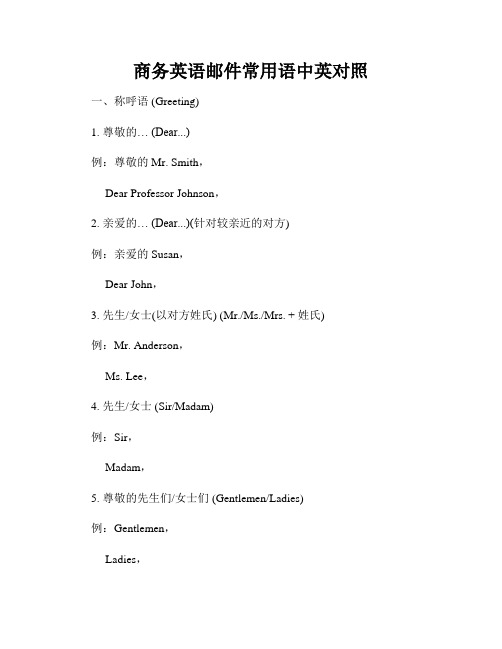
商务英语邮件常用语中英对照一、称呼语 (Greeting)1. 尊敬的… (Dear...)例:尊敬的Mr. Smith,Dear Professor Johnson,2. 亲爱的… (Dear...)(针对较亲近的对方)例:亲爱的Susan,Dear John,3. 先生/女士(以对方姓氏) (Mr./Ms./Mrs. + 姓氏)例:Mr. Anderson,Ms. Lee,4. 先生/女士 (Sir/Madam)例:Sir,Madam,5. 尊敬的先生们/女士们 (Gentlemen/Ladies)例:Gentlemen,Ladies,6. 美好的一天 (Good day)例:Good day,7. 你好 (Hello)例:Hello,二、引言 (Introduction)1. 我写信是因为... (I am writing to...)例:I am writing to inquire about...I am writing to confirm the details of...2. 我写信是要告知您... (I am writing to inform you...)例:I am writing to inform you that the shipment has been delayed...I am writing to inform you of the change in schedule...3. 请问您是否能... (I would like to ask if you could...)例:I would like to ask if you could provide me with more information...I would like to ask if you could extend the deadline...4. 非常感谢您的... (Thank you for...)例:Thank you for your prompt response...Thank you for your attention to this matter...三、表达意图 (Stating the Purpose)1. 我想要... (I would like to...)例:I would like to schedule a meeting with you...I would like to request a quotation for the products...2. 我需要... (I need...)例:I need your assistance with the project...I need to reschedule the appointment...3. 我希望能得到... (I would appreciate it if...)例:I would appreciate it if you could send me the contract by tomorrow...I would appreciate it if you could provide me with the necessary documents...四、解释和询问 (Explanation and Inquiry)1. 由于... (Due to...)例:Due to unforeseen circumstances, we have to cancel the event...Due to a technical issue, the website is currently not accessible...2. 是否可能... (Is it possible...)例:Is it possible to receive a refund for the damaged goods?Is it possible to schedule a conference call to discuss the project?3. 请您确认... (Could you please confirm...)例:Could you please confirm the delivery date?Could you please confirm the total cost of the order?五、给予回应 (Response)1. 我们会尽快处理... (We will process...)例:We will process your request and get back to you as soon as possible...We will process the payment and send you a confirmation email...2. 抱歉给您带来不便 (Apologies for the inconvenience caused)例:Apologies for the inconvenience caused. We are working to resolve the issue...We sincerely apologize for the delay in response...3. 确认收到 (Confirming receipt)例:I confirm that I have received the documents...We acknowledge receipt of your email...六、结束语 (Closing)1. 谢谢您的理解和合作 (Thank you for your understanding and cooperation)例:Thank you for your understanding and cooperation in this matter...We appreciate your understanding and cooperation...2. 如果您有任何问题,请随时与我联系 (If you have any questions, please feel free to contact me)例:If you have any questions, please feel free to contact me at any time...Please do not hesitate to contact me if you have any further inquiries...3. 祝您一切顺利 (Best regards)例:Best regards,Sincerely,以上是商务英语邮件常用语中英对照,希望对您有所帮助。
英语中那些委婉的语句_如何翻译商务英语
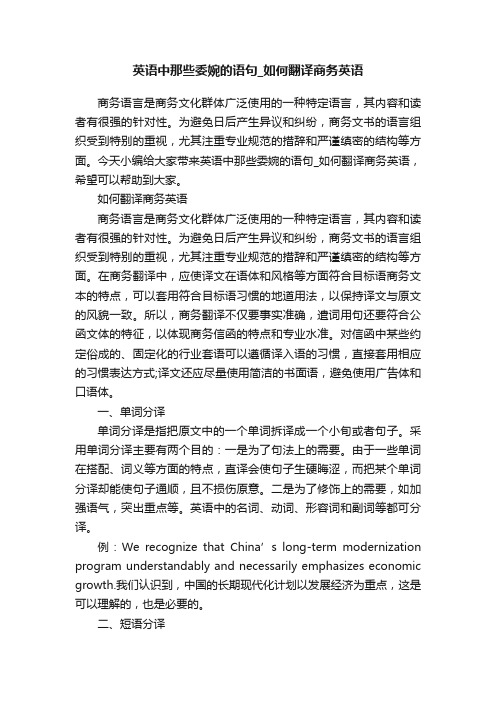
英语中那些委婉的语句_如何翻译商务英语商务语言是商务文化群体广泛使用的一种特定语言,其内容和读者有很强的针对性。
为避免日后产生异议和纠纷,商务文书的语言组织受到特别的重视,尤其注重专业规范的措辞和严谨缜密的结构等方面。
今天小编给大家带来英语中那些委婉的语句_如何翻译商务英语,希望可以帮助到大家。
如何翻译商务英语商务语言是商务文化群体广泛使用的一种特定语言,其内容和读者有很强的针对性。
为避免日后产生异议和纠纷,商务文书的语言组织受到特别的重视,尤其注重专业规范的措辞和严谨缜密的结构等方面。
在商务翻译中,应使译文在语体和风格等方面符合目标语商务文本的特点,可以套用符合目标语习惯的地道用法,以保持译文与原文的风貌一致。
所以,商务翻译不仅要事实准确,遣词用句还要符合公函文体的特征,以体现商务信函的特点和专业水准。
对信函中某些约定俗成的、固定化的行业套语可以遵循译入语的习惯,直接套用相应的习惯表达方式;译文还应尽量使用简洁的书面语,避免使用广告体和口语体。
一、单词分译单词分译是指把原文中的一个单词拆译成一个小旬或者句子。
采用单词分译主要有两个目的:一是为了句法上的需要。
由于一些单词在搭配、词义等方面的特点,直译会使句子生硬晦涩,而把某个单词分译却能使句子通顺,且不损伤原意。
二是为了修饰上的需要,如加强语气,突出重点等。
英语中的名词、动词、形容词和副词等都可分译。
例:We recognize that China’s long-term modernization program understandably and necessarily emphasizes economic growth.我们认识到,中国的长期现代化计划以发展经济为重点,这是可以理解的,也是必要的。
二、短语分译短语分译是指把原文中的一个短语分译成一个句子。
名词短语、分词短语、介词短语等有时都可以分译成句。
例1:These cheerful little trams,dating back to 1 873,chug and sway up the towering hills with bells ringing and people hanging from every opening.这些令人欢快的小缆车建于1873年,嘎嚓嘎嚓摇摆爬上高耸的山峦。
四种商务英语表达方式
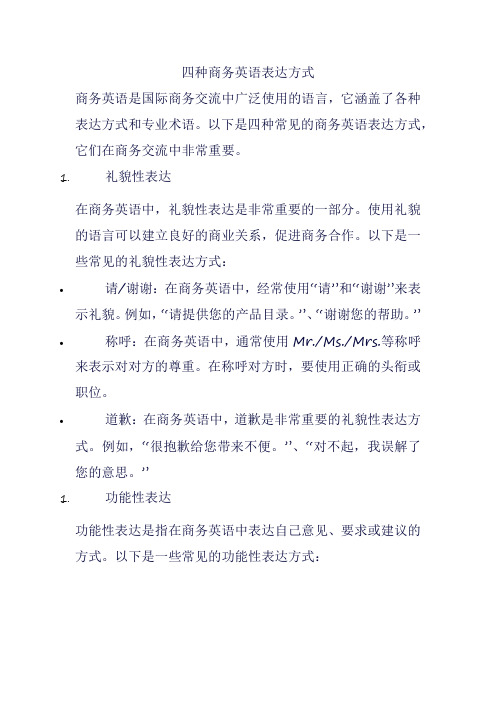
四种商务英语表达方式商务英语是国际商务交流中广泛使用的语言,它涵盖了各种表达方式和专业术语。
以下是四种常见的商务英语表达方式,它们在商务交流中非常重要。
1.礼貌性表达在商务英语中,礼貌性表达是非常重要的一部分。
使用礼貌的语言可以建立良好的商业关系,促进商务合作。
以下是一些常见的礼貌性表达方式:•请/谢谢:在商务英语中,经常使用“请”和“谢谢”来表示礼貌。
例如,“请提供您的产品目录。
”、“谢谢您的帮助。
”•称呼:在商务英语中,通常使用Mr./Ms./Mrs.等称呼来表示对对方的尊重。
在称呼对方时,要使用正确的头衔或职位。
•道歉:在商务英语中,道歉是非常重要的礼貌性表达方式。
例如,“很抱歉给您带来不便。
”、“对不起,我误解了您的意思。
”1.功能性表达功能性表达是指在商务英语中表达自己意见、要求或建议的方式。
以下是一些常见的功能性表达方式:•提议:在商务英语中,经常使用“提议”来表示自己的意见或建议。
例如,“我提议我们可以在下周的会议上讨论这个问题。
”•要求:在商务英语中,可以使用“要求”来表达自己的要求或建议。
例如,“我们要求贵方在合同签订后10天内发货。
”•建议:在商务英语中,可以使用“建议”来表达自己的建议或意见。
例如,“我建议我们可以在下个月会面讨论未来的合作计划。
”1.清晰性表达清晰性表达是指在商务英语中准确、清晰地表达自己的意思。
以下是一些常见的清晰性表达方式:•具体化:在商务英语中,具体化的表达方式可以使自己的意思更加清晰。
例如,“我们需要在本月底前完成这项任务。
”具体化表达方式可以避免歧义和误解。
•结构化:在商务英语中,结构化的表达方式可以使自己的意思更加清晰。
例如,“我们的目标是提高产品质量,降低成本并扩大市场份额。
”通过结构化的表达方式,可以使自己的意思更加有条理和清晰。
1.规范性表达规范性表达是指在商务英语中使用规范、正式的语言表达自己的意思。
以下是一些常见的规范性表达方式:•合同语言:在商务英语中,合同语言是非常规范、正式的语言。
商务英语口语900句中英文对照中文翻译全文翻译

商务英语口语900句中英文对照中文翻译全文翻译Unit 1希望与要求Part 11. We’d like to express our desire to establish business relationship with you on the basis of quality, mutual benefit and exchange of needed goods 。
我们希望在保证质量、互惠互利以及交易彼此需要的货物的基础上和你们建立业务关系。
2 .In order to extend our export business to your country we wish to enter direct business relations with you.为了扩大我们在贵国的出口业务,我们希望和你们建立直接贸易关系。
3。
Our hope is to establish mutually beneficial trading relations between us 。
希望在我们之间能够建立互惠互利的贸易关系.4。
We looking forward to further extension of pleasant business relations。
我们期待进一步保持愉快的业务关系.5. It's our hope to continue with considerable business dealing with you。
我们的希望是和你们保持可观的生意往来。
6。
We look forward to receiving your quotation very soon。
我们期待尽快收到你们的报价单。
7。
I hope you see from the reduction that we are really doing our utmost。
我希望你能够看到我们事实上已经作出了最大程度的让价。
商务英语的委婉表达及翻译

目录论文摘要 (2)一、委婉表达的含义 (3)二、商务英语中委婉表达的作用及运用 (3)三、商务英语中委婉表达的翻译原则 (6)四、结束语 (8)参考文献 (8)商务英语中的委婉表达及其翻译摘要:在人类社会中,交流是必要的。
要交流势必存在一些表达上的问题。
所以,就会有一些表达上的技巧。
委婉表达是人类使用语言过程中的一种普遍现象,它不仅是一种社会语言现象,更是一种文化现象。
不管是在日常生活还是在涉外交际中,我们都要进行语言交流。
由于某些生活习惯或习俗差异,以及不同文化背景的社会具有不同的忌讳,我们必须学会使用委婉表达以避免尴尬或者不愉快发生。
所以只有了解委婉表达的使用方式,才能达到成功交际的目的。
本文从委婉表达的作用出发,分析了商务英语中的委婉表达及其翻译,从而论证委婉表达法不仅是商贸用语的重要组成部分,也是商家在竞争中赢得客户的一个不可小窥的重要手段。
关键词:商务英语委婉表达作用运用翻译原则Tactful expressions in Business English and Its TranslationAbstract:Tactful expression is a universal phenomenon in the process of people’s language using. It’s not only a social languagephenomenon,but also a culture phenomenon.We have to communicate withlanguage,no matter indaily life or intercommunication withforeign countries.As to thedifferences between custom and lifestyle,nations with differentculture have different taboos.So ,we must learn tactful expression toavoid awkard and unpleasure stations,until we comprehend theusing way of tactful expression,we can have a successfulcommunication.This text is about tactful expression,it analysedtactful expression in business English and its translation,anddemonstrated that tactful expression is not only the importantpart of business language,but also an indispensability measurefor the business to attract clients in the strong competition. Key words: business English,tactfulexpression,function,usage,translation principles商务英语中的委婉表达及其翻译委婉表达及其翻译可以反映出各种各样的心理,从而也体现出了委婉表达的各种社会交际功能。
(完整版)商务英语句子翻译整理
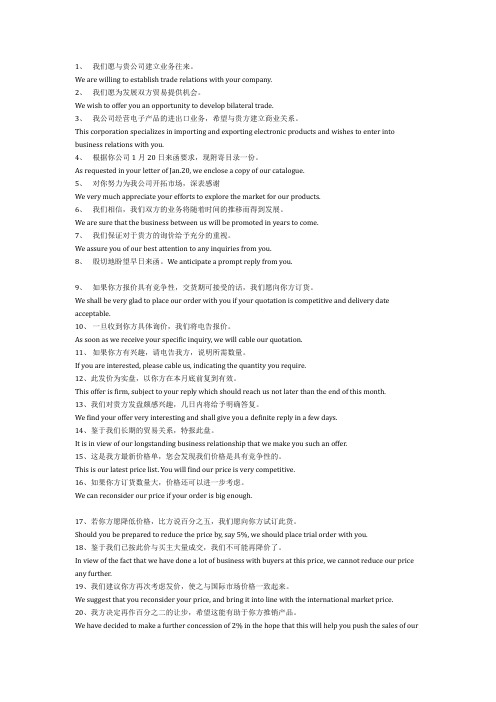
1、我们愿与贵公司建立业务往来。
We are willing to establish trade relations with your company.2、我们愿为发展双方贸易提供机会。
We wish to offer you an opportunity to develop bilateral trade.3、我公司经营电子产品的进出口业务,希望与贵方建立商业关系。
This corporation specializes in importing and exporting electronic products and wishes to enter into business relations with you.4、根据你公司1月20日来函要求,现附寄目录一份。
As requested in your letter of Jan.20, we enclose a copy of our catalogue.5、对你努力为我公司开拓市场,深表感谢We very much appreciate your efforts to explore the market for our products.6、我们相信,我们双方的业务将随着时间的推移而得到发展。
We are sure that the business between us will be promoted in years to come.7、我们保证对于贵方的询价给予充分的重视。
We assure you of our best attention to any inquiries from you.8、殷切地盼望早日来函。
We anticipate a prompt reply from you.9、如果你方报价具有竞争性,交货期可接受的话,我们愿向你方订货。
We shall be very glad to place our order with you if your quotation is competitive and delivery date acceptable.10、一旦收到你方具体询价,我们将电告报价。
商务英语中的委婉表达及其翻译【文献综述】
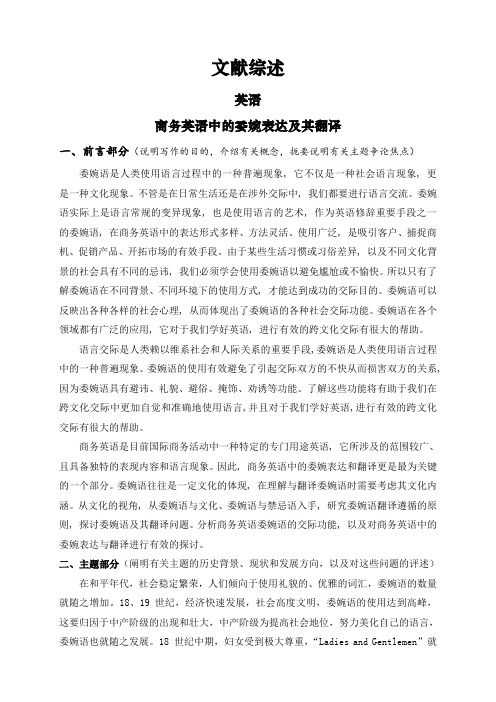
文献综述英语商务英语中的委婉表达及其翻译一、前言部分(说明写作的目的,介绍有关概念,扼要说明有关主题争论焦点)委婉语是人类使用语言过程中的一种普遍现象, 它不仅是一种社会语言现象, 更是一种文化现象。
不管是在日常生活还是在涉外交际中, 我们都要进行语言交流。
委婉语实际上是语言常规的变异现象, 也是使用语言的艺术, 作为英语修辞重要手段之一的委婉语, 在商务英语中的表达形式多样、方法灵活、使用广泛, 是吸引客户、捕捉商机、促销产品、开拓市场的有效手段。
由于某些生活习惯或习俗差异, 以及不同文化背景的社会具有不同的忌讳, 我们必须学会使用委婉语以避免尴尬或不愉快。
所以只有了解委婉语在不同背景、不同环境下的使用方式, 才能达到成功的交际目的。
委婉语可以反映出各种各样的社会心理, 从而体现出了委婉语的各种社会交际功能。
委婉语在各个领域都有广泛的应用, 它对于我们学好英语, 进行有效的跨文化交际有很大的帮助。
语言交际是人类赖以维系社会和人际关系的重要手段,委婉语是人类使用语言过程中的一种普遍现象。
委婉语的使用有效避免了引起交际双方的不快从而损害双方的关系,因为委婉语具有避讳、礼貌、避俗、掩饰、劝诱等功能。
了解这些功能将有助于我们在跨文化交际中更加自觉和准确地使用语言,并且对于我们学好英语,进行有效的跨文化交际有很大的帮助。
商务英语是目前国际商务活动中一种特定的专门用途英语, 它所涉及的范围较广、且具备独特的表现内容和语言现象。
因此, 商务英语中的委婉表达和翻译更是最为关键的一个部分。
委婉语往往是一定文化的体现, 在理解与翻译委婉语时需要考虑其文化内涵。
从文化的视角, 从委婉语与文化、委婉语与禁忌语入手, 研究委婉语翻译遵循的原则, 探讨委婉语及其翻译问题。
分析商务英语委婉语的交际功能, 以及对商务英语中的委婉表达与翻译进行有效的探讨。
二、主题部分(阐明有关主题的历史背景、现状和发展方向,以及对这些问题的评述)在和平年代,社会稳定繁荣,人们倾向于使用礼貌的、优雅的词汇,委婉语的数量就随之增加。
《商务英语口语大全【完整版】》

《商务英语口语大全【完整版】》一、商务问候与介绍1. 问候Good morning/afternoon/evening, it's a pleasure to meet you.(早上/下午/晚上好,很高兴见到您。
)How do you do? I've heard a lot about you.(您好,我久闻大名。
)It's nice to finally put a face to the name.(很高兴能将名字与人对上号。
)2. 自我介绍My name is [Your Name], and I'm the [Your Position] at [Company Name].(我叫[您的名字],是[公司名称]的[您的职位]。
) I'm looking forward to working with you on this project.(我期待与您共事这个项目。
)二、商务洽谈与沟通1. 表达意见In my opinion, [Your Opinion].(在我看来,[您的意见]。
)I believe that [Your Idea] could be beneficial for both parties.(我相信[您的想法]对双方都有益。
)I'd like to suggest [Your Suggestion].(我想提出[您的建议]。
)2. 谈判技巧I understand your concerns, but let's consider the possibilities from another angle.(我理解您的担忧,但让我们从另一个角度考虑一下可能性。
)If we can agree on [Certain Terms], I'm confident that we can finalize the deal.(如果我们能在[特定条款]上达成一致,我相信我们可以完成这笔交易。
商务英语信函中的委婉语与翻译
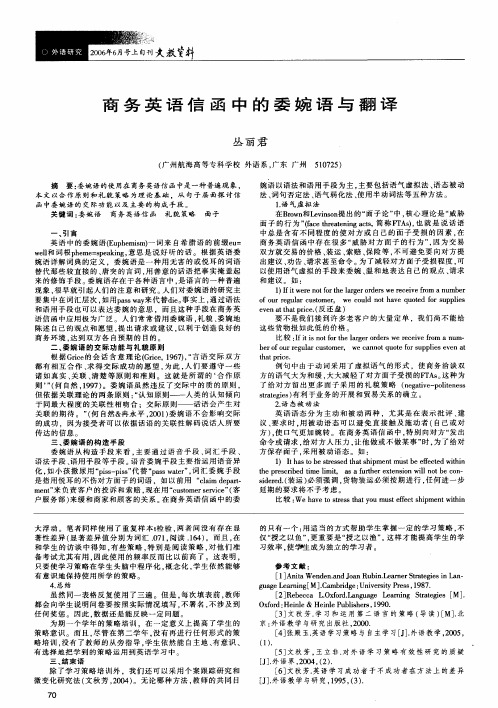
丛丽君
(广州航海高等专科学校 外语系, 广东 广州 510725)
摘 要:委婉语的使用在商务英语信函中是一种普遍现象, 本文以合作原则和礼貌策略为理论基础 ,从句子层面探讨信 函中委婉语的交际功能以及主要的构成手段 。 关键词 :委婉语 商务英语信 函 礼貌策略 面子
和语用手段也可以表达委婉的意思,而且这种手段在商务英 语信函中应用极为广泛。人们常常借用委婉语, 、 礼貌 委婉地 陈述自己的观点和愿望 , 提出请求或建议, 以利于创造良 好的 商务环境 , 达到双方各 自预期的目的。
二、 委婉语的交际功能与礼貌原则
要集中在词汇层次, 如用pass w ay来代替die。 事实上, 通过语法
参考文献 :
虽然同一表格反复使用了三遍。但是, 每次填表前, 教师 都会向学生说明问卷要按照实际情况填写, 不署名, 不涉及到 任何奖惩。因此, 数据还是能反映一定问题。 为期一个学年的策略培训 ,在一定意义上提高了学生的 策略意识。而且, 尽管在第二学年, 没有再进行任何形式的策 略培训, 没有了教师的从旁指导, 学生依然能自主地、 有意识、
延期的要求将不予考虑 。
比 较:W have to stress that you must effect shipment within e
的只有一个 :用适当的方式帮助学生掌握一定的学习策略 , 不
仅“ 授之以鱼”更重要是“ , 授之以渔” 这样才能提高学生的学 。
习效率, 生成为独立的学习者。 使}0
都有相互合作、 求得交际成功的愿望, 为此, 人们要遵守一些 诸如真实、 关联、 清楚等原则和准则。这就是所谓的‘ 合作原 则”(何 自 1997) 。委婉语虽然违反了交际中的质的原则, ’ 然,
商务英语:10个必备商务用语
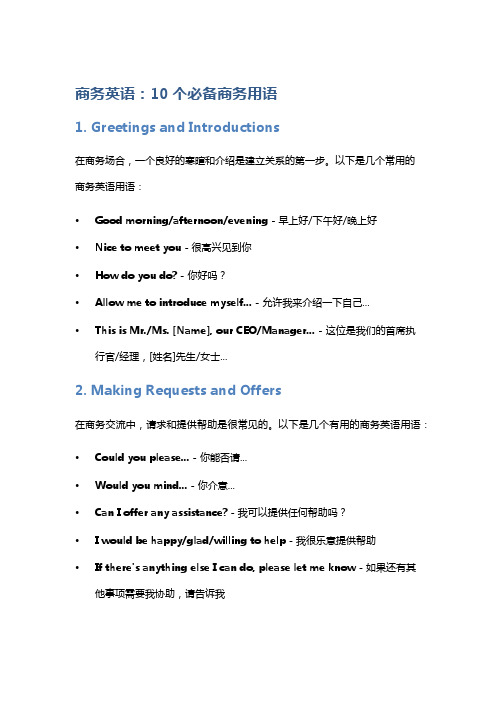
商务英语:10个必备商务用语1. Greetings and Introductions在商务场合,一个良好的寒暄和介绍是建立关系的第一步。
以下是几个常用的商务英语用语:•Good morning/afternoon/evening - 早上好/下午好/晚上好•Nice to meet you - 很高兴见到你•How do you do? - 你好吗?•Allow me to introduce myself... - 允许我来介绍一下自己...•This is Mr./Ms. [Name], our CEO/Manager... - 这位是我们的首席执行官/经理,[姓名]先生/女士...2. Making Requests and Offers在商务交流中,请求和提供帮助是很常见的。
以下是几个有用的商务英语用语:•Could you please... - 你能否请...•Would you mind... - 你介意...•Can I offer any assistance? - 我可以提供任何帮助吗?•I would be happy/glad/willing to help - 我很乐意提供帮助•If there's anything else I can do, please let me know - 如果还有其他事项需要我协助,请告诉我安排会议时,需要使用适当的商务用语来表达你的意图和计划。
以下是几个常见的商务英语用语:•I'd like to arrange a meeting - 我想安排一次会议•Could we schedule a meeting for [date/time]? - 我们能否安排在[日期/时间]开会?•Can you please check your availability? - 请您确认您的时间是否方便?•Let's meet at [location] - 让我们在[地点]见面•Would it be possible to reschedule the meeting? - 是否可以重新安排会议?4. Making Invitations在商务场合,邀请某人出席活动或参加会议是很常见的。
商务英语中的委婉表达与翻译

yours truly, (signature) Wang Bin
2、英语信函的语言特点:Four Cs原则
Clearness Conciseness Correctness Courtesy
3、英语信函的翻译:
1) ABCD原则 Accuracy Brevity Clarity Difference
family are enjoying this holiday season in
excellent health.
My family, who are well and happy, join me
in my good wishes. May every year unite our
hearts more closely.
确实,没有他的生活无论如何都不会再是
原样,但我们一定要尽可能努力地生活下去, 并期望在天国有重逢的一天。
爱你的,
邦妮
4)商务信函的常用翻译技巧:
(1)重复、省略、否定、转换等技 巧的灵活使用。
(2)掌握分寸,体现原文文体,尽 力保持“公事公办”的慎重态度
(3)酌情使用一些常用套语, 如:贵,乞谅,承蒙,为盼,赐复 等。Dear Sir(s)/ Madam尊敬的阁下 /先生/女士/谨启者/执事先生/台鉴
is doubtlessly a pride of your family.
We are very happy for you and wish to
extend to you our utmost congratulations. I believe
that the knowledge ha has acquired will enable
常用商务英语口语900句
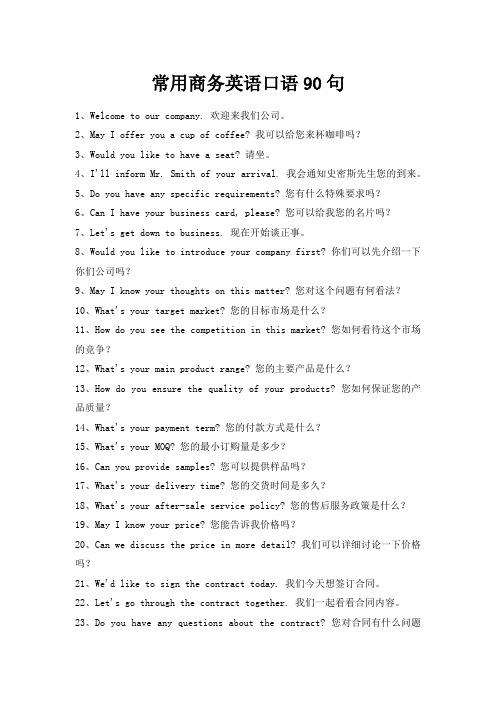
常用商务英语口语90句1、Welcome to our company. 欢迎来我们公司。
2、May I offer you a cup of coffee? 我可以给您来杯咖啡吗?3、Would you like to have a seat? 请坐。
4、I'll inform Mr. Smith of your arrival. 我会通知史密斯先生您的到来。
5、Do you have any specific requirements? 您有什么特殊要求吗?6、Can I have your business card, please? 您可以给我您的名片吗?7、Let's get down to business. 现在开始谈正事。
8、Would you like to introduce your company first? 你们可以先介绍一下你们公司吗?9、May I know your thoughts on this matter? 您对这个问题有何看法?10、What's your target market? 您的目标市场是什么?11、How do you see the competition in this market? 您如何看待这个市场的竞争?12、What's your main product range? 您的主要产品是什么?13、How do you ensure the quality of your products? 您如何保证您的产品质量?14、What's your payment term? 您的付款方式是什么?15、What's your MOQ? 您的最小订购量是多少?16、Can you provide samples? 您可以提供样品吗?17、What's your delivery time? 您的交货时间是多久?18、What's your after-sale service policy? 您的售后服务政策是什么?19、May I know your price? 您能告诉我价格吗?20、Can we discuss the price in more detail? 我们可以详细讨论一下价格吗?21、We'd like to sign the contract today. 我们今天想签订合同。
商务英语口语900句中英文对照中文翻译全文翻译

商务英语口语900句中英文对照中文翻译全文翻译Unit 1希望与要求Part 11. We'd like to express our desire to establish business relationship with you on the basis of quality, mutual benefit and exchange of needed goods .我们希望在保证质量、互惠互利以及交易彼此需要的货物的基础上和你们建立业务关系。
2 .In order to extend our export business to your country we wish to enter direct business relations with you.为了扩大我们在贵国的出口业务,我们希望和你们建立直接贸易关系。
3. Our hope is to establish mutually beneficial trading relations between us .希望在我们之间能够建立互惠互利的贸易关系。
4. We looking forward to further extension of pleasant business relations.我们期待进一步保持愉快的业务关系。
5. It’s our hope to continue with considerable business dealing with you.我们的希望是和你们保持可观的生意往来。
6. We look forward to receiving your quotation very soon.我们期待尽快收到你们的报价单。
7.I hope you see from the reduction that we are really doing our utmost.我希望你能够看到我们事实上已经作出了最大程度的让价。
商务英语口语900句中英文对照中文翻译全文翻译
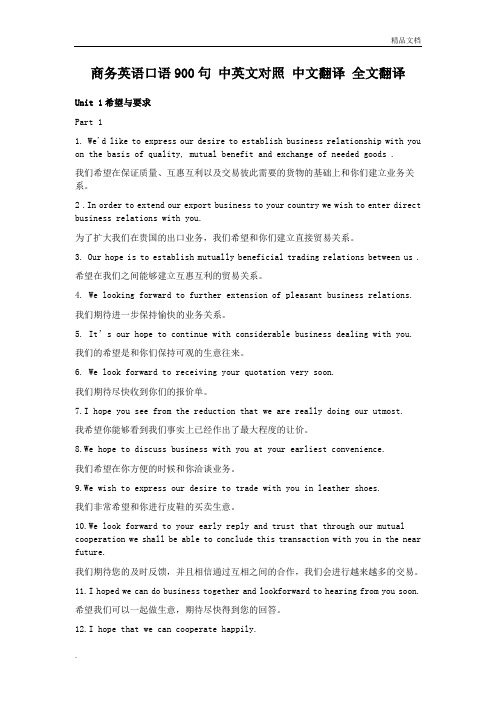
商务英语口语900句中英文对照中文翻译全文翻译Unit 1希望与要求Part 11. We'd like to express our desire to establish business relationship with you on the basis of quality, mutual benefit and exchange of needed goods .我们希望在保证质量、互惠互利以及交易彼此需要的货物的基础上和你们建立业务关系。
2 .In order to extend our export business to your country we wish to enter direct business relations with you.为了扩大我们在贵国的出口业务,我们希望和你们建立直接贸易关系。
3. Our hope is to establish mutually beneficial trading relations between us .希望在我们之间能够建立互惠互利的贸易关系。
4. We looking forward to further extension of pleasant business relations.我们期待进一步保持愉快的业务关系。
5. It’s our hope to continue with considerable business dealing with you.我们的希望是和你们保持可观的生意往来。
6. We look forward to receiving your quotation very soon.我们期待尽快收到你们的报价单。
7.I hope you see from the reduction that we are really doing our utmost.我希望你能够看到我们事实上已经作出了最大程度的让价。
商务英语口语句中英文对照中文翻译全文翻译

Unit1希望与要求Part11.We'dliketoexpressourdesiretoestablishbusinessrelationshipwithyouonthebasisofquality,mutual benefitandexchangeofneededgoods.我们希望在保证质量、互惠互利以及交易彼此需要的货物的基础上和你们建立业务关系。
2.Inordertoextendourexportbusinesstoyourcountrywewishtoenterdirectbusinessrelationswithyou.为了扩大我们在贵国的出口业务,我们希望和你们建立直接贸易关系。
3.Ourhopeistoestablishmutuallybeneficialtradingrelationsbetweenus.希望在我们之间能够建立互惠互利的贸易关系。
4.Welookingforwardtofurtherextensionofpleasantbusinessrelations.我们期待进一步保持愉快的业务关系。
5.It’sourh opetocontinuewithconsiderablebusinessdealingwithyou.我们的希望是和你们保持可观的生意往来。
6.Welookforwardtoreceivingyourquotationverysoon.我们期待尽快收到你们的报价单。
7.Ihopeyouseefromthereductionthatwearereallydoingourutmost.我希望你能够看到我们事实上已经作出了最大程度的让价。
8.Wehopetodiscussbusinesswithyouatyourearliestconvenience.我们希望在你方便的时候和你洽谈业务。
9.Wewishtoexpressourdesiretotradewithyouinleathershoes.我们非常希望和你进行皮鞋的买卖生意。
商务英语口语900句中英文对照中文翻译全文翻译
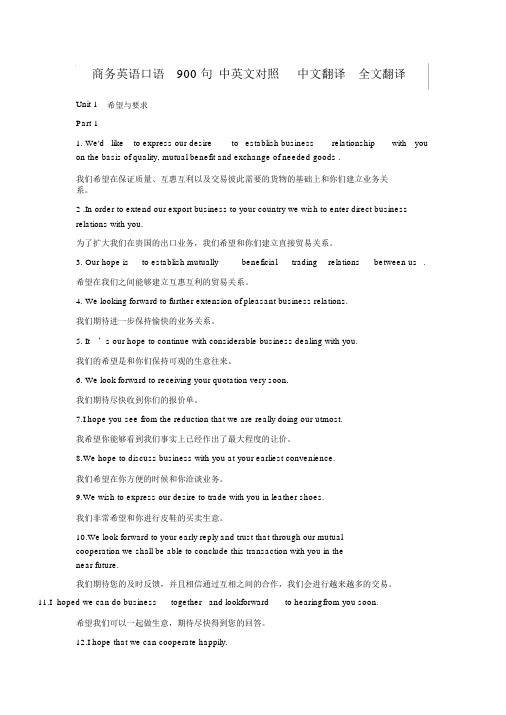
商务英语口语900 句中英文对照中文翻译全文翻译Unit 1希望与要求Part 11. We'd like to express our desire to establish business relationship with youon the basis of quality, mutual benefit and exchange of needed goods .我们希望在保证质量、互惠互利以及交易彼此需要的货物的基础上和你们建立业务关系。
2 .In order to extend our export business to your country we wish to enter direct businessrelations with you.为了扩大我们在贵国的出口业务,我们希望和你们建立直接贸易关系。
3. Our hope is to establish mutually beneficial trading relations between us.希望在我们之间能够建立互惠互利的贸易关系。
4. We looking forward to further extension of pleasant business relations.我们期待进一步保持愉快的业务关系。
5. It’s our hope to continue with considerable business dealing with you.我们的希望是和你们保持可观的生意往来。
6. We look forward to receiving your quotation very soon.我们期待尽快收到你们的报价单。
7.I hope you see from the reduction that we are really doing our utmost.我希望你能够看到我们事实上已经作出了最大程度的让价。
商务英语中的委婉表达及其翻译【毕业论文】.doc
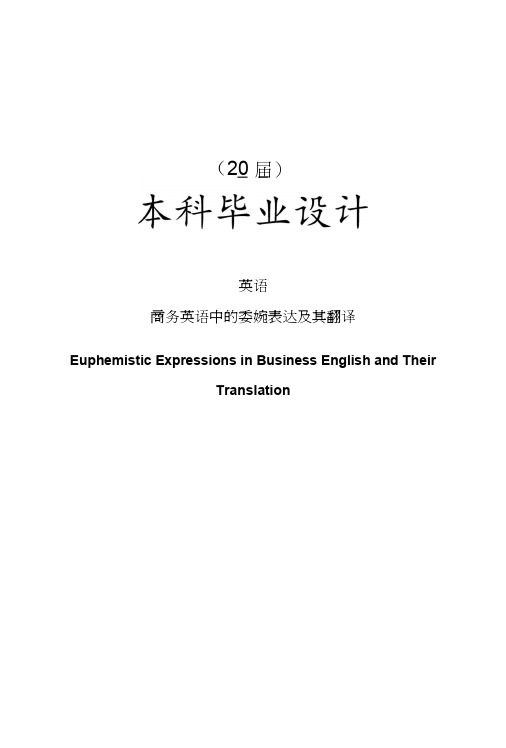
(20 届)英语商务英语中的委婉表达及其翻译Euphemistic Expressions in Business English and TheirTranslation随着国际贸易的不断发展,商务英语作为一种特定的专门用途英语,也越来越重要。
为了建立良好的商务环境,树立尽可能完美的形象,给客户以满意和信心,达到预期的目的和效果。
因此商务英语屮的的委婉表达及其翻译是非常重要的。
本文介绍丫委婉语的定义、特征,以及交际功能,并从词汇、语法两个方面归纳分析了商务英语中的委婉表达方式,论文最后提出Y直译法、意译法和移植法三种翻译策略。
希望人们从屮丫解更多关于商务英语屮的委婉表达及其翻译的知识,并使这些知识服务于我国与各国的商务往来。
关键词:商务英语;委婉表达;翻译AbstractWith the development of international trade, Business English has become more and more important as a specially appointed English for Specific Purposes. In order to establish a good business environment, and establish a perfect image of as much as possible to give customers satisfaction and confidence in each of the parties to achieve the intended purpose of trade. This thesis first introduces the difinitions,characteristics and communicative functions of euphemism. The euphemistic expressions in business English are then analysed from lexical and grammatical prospectives. Finally three translation strategies are proposed: literal translation,free translation, transplanting. It is hoped that people can get more knowledge about translation of euphemism in business English and can make use of this knowledge to serve for foreign trade of our country.Key words:Business English; Euphemism ; TranslationContentsAbstract ......................................................................................................................................... I I1Introduction (1)1J Definition and Classification of Euphemism (1)1.2Characteristics of Euphemism (2)2Communicative Functions of Euphemism (2)The Function of Taboo (3)The Function of Politeness (4)The Function of Disguise (5)The Function of Elegance (5)3The Expression Forms of Euphemism inBusiness English (6)The Lexical Approach (6)Noun (6)Verb (7)Adverb (7)3J.4 Preposition and Preposition Phrase (7)()The Grammatical Approach (8)()Past Tense (8)()Passive Voice (8)33ood•••••••••••••••••••••••••••••••••••••••••••••••••••••••••••••••••••••••••••••••••••••••t1•••••••••••••••••••••••••••••••••••••••••••••••••••••••••••••••••••參•••••••••••••••••••• 104The Translation Strategies of Euphemism in Business English (10)si•••••••••••••••••••••••••••••••••••••••••••••••••••••••••••••••••••••••••••••••••••••••••••• 114.2Free Translation (11)4.3Transplanting (12)5Conclusion (12)Bibliography (14)Acknowledgements (15)IntroductionlJ Definition and Classification of EuphemismEuphemisms have existed throughout recorded history. In early English poetry the heroes did not literally "die", but euphemistically "lay” or "fall"(George H.McKnight, 1923:268). Similar feature of language is familiar in modern language: ” we will have to let you go” replaces"you*re fired" in English;‟1人寿保险‟‟(life insurance) replaces "死亡保险"(insurance that is paid when you die) in Chinese. These are typical example of verbal euphemisms, namely, euphemisms in a narrow sense.Classification of euphemism is well manifested in the various definitions of euphemism, which reveal the nature, and the characteristics of euphemism from different perspectives.Euphemism, one rhetoric term in English,is "Euphemismos” in ancient westerm rhetoric. It is usually used ‟‟to pre serve decency when referring to unpleasant things n(Vickers,1988:407). In current English dictionaries,euphemisms are defined as follow:(1)"substitution of an inoffensive term for one considered blunt oroffensive".(2)‟‟word,etc. used in place of one avoided as e.g. offensive,indecent, oralarming‟‟.There are also other definitions:"Substituting an inoffensive or pleasant term for a more explicit,offensive one,therebyveneering the truth by using kind words.n(Nearman et al,1990:1 )H the conveying of a harsh or an unpleasant truth gently."(Zeiger,1978:355)All the euphemisms can be divided into two groups: conventionalized euphemisms and non-conventionalized euphemisms. The differences between these two groups lie in that those non-conventionalized euphemisms strongly depend on the particular context,and their rhetoric function may disappear or impossible to understand without the context while the conventionalized euphemisms have already been accepted so well that they are somewhat like idioms and people can understand them without referring to a particular context. For example, we all know what toilet means when one says he wants to go to the toilet. But in this sentence: ’’我浑身颤抖了一下,我害怕,我父亲会不会也打发我去'享福’ .We can hardly drag out the meaning of the euphemism ‟‟享福’’ without reading the sentence: ••哭啥子奥,死了,还不享福去了!"in the context.The thesis mainly deals with the translation of verbal euphemism because of its wider application and closer relationship with translation study. So the word ‟‟euphemism” in the following thesis refers specificallyto verbal euphemism.(1)Characteristics of EuphemismThe meaning of euphemisms cannot be understood if we take a direct inference to the object that the language refers to.It is the conversational implications conveyed by the language,taking such elements as the speakers and the contexts into consideration. When we come into a euphemism, we should not only understand what it refers to superficially but also understand the implied meaning and purpose generated from the context,or the environment. Euphemism is also active and elegant. To distinguish euphemisms from other figures of speech, we should judge whether the original expression is about sex,religion,crime,death, darkness, violence,mental health,excretion,fatal diseases etc. Which often embarrasses both the speakers and the listeners and as a result are often avoided. The mild substitution are not embarrassing and are intentionally avoided by the speakers. It is obvious that euphemism has the following characteristics:(1)Substitution is the base of producing euphemism;(2)An euphemism has two levels of meaning: a surface meaning and a deepmeaning, and the real meaning is the deep meaning;(3)Euphemisms are mild expressions which can alleviate the harshness of theoriginal expressions and can cover some of the original purposes of thespeaker.(Wang Dechun 2001:98)Communicative Functions of EuphemismLanguage communication is an important way to maintain the social relationship among human beings. The use of euphemism avoids causing the unpleasantness of two communicative sides and damaging their relationship. Based on the implication of euphemism, the paper mainly explores the functions of taboo, politeness, disguise and elegance, which is helpful for our conscious and correct language use in business English.The Function of TabooIn the Anglo-Saxon countries,people widely believed in God. Out of fear of God,they dared not directly maintain the name of Lord God (Jehoval),so a lot of euphemisms came into being,for example: theAlmighty,the Supreme Being, Holy one,the Eternal,the creator, the maker,the Savior,the Lord of Lords,the King of Kings.In the early human society, science underdeveloped, people can not know and explain the natural phenomena,so they always feel terrified with a mystery.n Death” is a taboo in a lot of countries,so people produce some euphemisms.For example:"pay one's debt to nature"--••还对自然的债务”‟‟go west‟‟--‟‟归丙""sleep the final sleep"--"睡最后一觉"‟‟be called to God"--"到上帝那儿去报到""go to heaven"--"去天堂""breathe the one's last"—"最后一次呼吸""pass away”--"永别了n"sleep with one's fathers"--‟‟与父亲睡在一起"” go to glory”--”去荣耀•’In addition, things related to death are beautified. For example ‟‟coffin” is replaced by ‟‟box” ;"grave-yard •‟ is replaced by "sleeping place‟‟;n funeral”is replaced by "memorial service‟‟.The Function of PolitenessPoliteness is the human civilization's tag. Politeness principle is an important principle in human society. In communication,people always pay attention to politeness to other people for avoiding conflict. There are many aspects about politeness function.Profession is a sensitive topic in society. According to Chinese‟s idea, all professions are equal. But as the manual worker or service personal,they don‟t like to hear the name of their prof ession by other people. So they choose a better name instead of them.For example:‟‟waiter,waitress"…n dinning-room attendants”H maid H—"domestic”‟‟garbage collector” ---H sanitary engineer”n scretary H ---H administrative assistant‟‟n harlot n…M street girl n or "member of the oldest profession11‟‟cook、-- "chef*‟‟housewife” --- "domestic engineer”Privation and unemployment are also sensitive topics in society. In communication, everyone wants to get respect from the other side. Even though people are poor,they would be angry when they discuss privation or about connection things. For example, in Chinese, people always say n手头紧"or "临时周转不灵” or "经济上有些困难” to mean "they are short of money”. In English, "penniless” is replaced by "out of pocket”;"poor” is replaced by ‟‟needy”;‟‟poor people” is replaced by ‟‟underprivileged people‟‟ or "to be down on one's luck' Unemployment is a common phenomenon, and people don‟t like to talk about it directly. So ‟‟unemployed workers” are replaced by "welfare workers H; "dismis s” is replaced by ‟‟lay off ‟‟in communication.When they speak of relieving the bowels,they use ‟‟ go to washroom‟1,"go to W.C.n,‟‟answer nature‟s call‟‟ . If you say H I have to go to the toilet.” when talking with others, that is very impolite. We shoul d say ‟‟May I leave the room?‟‟ or H Fm going to do my business.” There are other examples: Unfortunately we cannot meet your needs because you failed to send your check.We shall be glad to meet your needs as soon as we receive your check.In case (1),the tone is very abrupt,too direct; while in case (2),the euphemistic tone is much more polite. In addition, the politeness function emphasizes the sake of more for each other.()The Function of DisguiseIn English, euphemism is used to disguise some grave society problem, such as privation and crime. There are some examples:2.1‟‟in debt” …H cash advance11 or H in difficulties2.2‟‟unemployed mother” ---M welfare mother”2.3‟‟striking” …"industrial action” or ‟‟industrial dispute‟‟2.4‟‟economic recession” …"period of economic adjustment‟‟At present, crime rate is particularly high, so there are many related euphemisms, especially juvenile delinquency. For example, ‟‟delinquent1‟ is replaced by "problem children”. We can not say that their childrenare thrown in jail,otherwise they will be unhappy. So we can say that the children are in the set-up center. And the other parlance is that they enjoy the government‟s expenses. International relation‟s choice of words are more cautious,if we say that they are "poor and backward coun tries‟‟,both sides‟ relation will sink into impasse. Even though they are underdeveloped countries,they will be unhappy. But we use ‟‟developing countries‟‟ and "emerging countries”,they will feel better.()The Function of Elegance‟‟Using neutral or commendatory word to replace derogatory word or sentence's the euphemism‟s elegance function. In the Eastern and Western culture, some about disease,death, human excretion, the Health and body parts, sex, body shape and other things related to taboo, are often considered to be vulgar,indecent. So people will not bear to say that things directly, through the song words, taboo and the other meanings to beautify or dilute them, so that they are more gentle. English euphemism is a best case. Such as,"hairdresser is re placed by ‟‟beautician”;‟‟press man” is replaced by "press operator”.People always use the euphemism properly to avoid awkwardness, unhappyness,disgust. The use of euphemism is not only to win the other side enough reputations,but also reflects the speak er‟s status,graceful bearing. The use of elegant and subtle language is a kind of aesthetic needs of the people as well as the civilization needs.The Expression Forms of Euphemism in Business EnglishEuphemism expressions are commonly used in business correspondence and business negotiation. Which is not only a social language phenomenon, but it is also a cultural phenomenon. Business English has its own unique style, usual format, the professional vocabulary and expressions.Because the customer is their God. Euphemism implication is widely in business English, hardly penetrate every link of business affairs. For example,in international trade, establishing trade relations, inquiry, offer, counter offer, repulse,credit information, proforma invoice (P/I),order goods, shipping,insurance, and so on,they exist in everywhere. Expression skills are flexible and ingenious. By making an analysis of euphemistic expressions used in business correspondences and business negotiations,it mainly discusses the fulfillment of euphemistic expressions in business English through the following four ways: the subjunctive mood, passive voice,past tense, tactful negative. So the business personnel can fully understand and appreciate the euphemistic expressions and achieve a success in the business competitions.3.1The Lexical ApproachNounIn business English, people always express negative by noun.‟‟We are extremely sorry for our inability to advance shipment.”This sentence avoid semantic strength consciously, using ‟‟inability” to express "we can not u implicitly. The meaning of "can not” is weakened by the writer,so it is easier to accept for the other party.VerbIn the business negotiation, we can use "think' "hope”,"regret' H please n to express subjective opinions and views. The expressed views and suggested request become not subjective and arbitrary, and the tone is tactful. But the view is distinct,and semantic is clear. There are some examples:1n We regret very much that it is necessary to complain about the non-delivery ofthe 10,000 tons of sugar under contract article 23.”2‟‟ We hope delivery will be made according to schedule.H3” Please make the shipment in May or early as possible.‟•AdverbIn business negotiation or correspondence contract process, it is seem impolite if use the negative word directly to the other party‟s views,request and suggestion . It is easily to cause displeased and dislike for the the other of side. Even it get into trouble with the other side, affect the business‟ negotiation or disruption directly. It go against to establish good trade relations for both sides. So it is often to use one of the adverbs: unfortunately,scarcely, hardly,rather,almost,slightly. And it create the negotiation atmosphere of consultation on the basis of equality. For example:‟‟we appreciated the good quality of your products, but unfortunately your prices appear to be onthe high side even of this quality.”‟‟I am really sorry that our products can hardly satisfy your requirement.‟‟In the second example,"hardly” is the euphemism of ‟‟not' to avoid absolutization.Preposition and Preposition PhraseIn business English, sometimes the preposition and preposition phrase are often used, and the tone of negative would not be clear. So other people feel respected."As some items under your order are beyond our business scope, we can only accept your orderpartially.‟‟"As your counter bid is not up to the present market level,we are sorry that we have to give youa negative reply.”In the first sentence, ‟‟beyond our business scope‟‟ imply the negative.3.2 The Grammatical Approach(1)Past TenseWe sometimes push the time of verb backward in business negotiation and business letters. Such as use the past tense to substitute present tense. So that it can make the tone more politely and make it have more tone of negotiation. At last make it come to business successfully."Enclosed is a feature article from October 23 China daily which I thought you might find ininteresting.”‟‟We wanted to know whether you could effect shipment one month earlier.”"We want to know whether you can effect shipment one month earlier/1"We found the prices of your machines a little bit higher than acceptable.The first sentence, moreover,in order to make the tone tactfully,"hope,wonder,think,want” and s o on,their past tense also express the present tence.The two sentences in case (2),second sentence is easier to accepted by the other side.The third sentence actually mean that: we found the price of your machines are so high that we can not accept. Speaker with comparative sentences, and compared with the a knockout level before to decorate.Among face to face business negotiation and business letters,when we express inquiry, request or express different opinion with the other side, sometimes use“Can you“will you...?‟‟,“I want".‟‟,“I wonder".‟‟,“I am sure.J‟wHl show crude and rude, confirm and absolute on the tone. When use “Could you...?”,“Would you...?”,“ I wanted...‟‟,“I wondered...‟‟,…… I was sure...”,it will become more subjunctive kind, gentle, decent and easily accepted by the other side.(2)Passive VoiceAmong business letters, we should use active voice in many conditions so that can express both opinions about trade explicitly. However,in other conditions, passive voice is adopted to make the toneimplicatively,and avoid aggressive. So it conformed to the characteristic of business English."Upon inspection, it was found that your last shipment is not up to theagreed standard. ” (Wang Hengen 2009:57-59)‟‟You should be informed that the shipment tim e is February or March at our optionand the goods will be shipped in one lot.”‟‟Since it is agreed that we have the right to reject the goods when they are disqualifiedupon examination by China Commodity Inspection Bureau at the port of destination,we regret to inform you that we have to return the goods to you at your expense/"As the date of delivery is approaching,you are requested to expedite theestablishment of the L/C?‟‟As the date of delivery is approaching,we request you to expedite the establishment of the L/C广As well-known to all,active voice emphasizes that it is an executive of actions. And passive voice emphasizes that it is an object of actions. In example three,‟‟to bestressed",‟‟must be effected‟‟,such as ‟‟will not be considered” weaken the executors “we”,“you”. We want emphasize that according to the contract,agreement or the stipulation of obligations and responsibilities prescribed, and thus more accord with international business practices.(3)Subjunctive MoodIn our daily life,people usually use subjunctive to express our opinions. When we request somebody, adverse somebody and persuade somebody, we always use euphemistic and implicative manners. In Business negotiations and business letters, businessmen pay more attention to their tones,and always avoid to expressing directly and positively, and use subjunctive tone to express our opinions,requests or adverse. In this way, they can achieve both purposes in the atmosphere of equality and friendly. Also it will be helpful to establish long term business relationship.n If it were not for the regular orders we receive from a number of our customers, we could not have quoted for supplies even at these price.‟‟n We wish we could lower our price but unfortunately we cannot do so.”‟‟May we su ggest that you make some allowance on you quoted price so as to enable us to introduce your goods to our customers?"H I suggest you make a reduction in price, otherwise, we could hardly go on with ourdiscussion.”Among the above example sentences, because of adverb adopted Subjunctive tone, it eased the tones of both sides when they expressed their opinions, requested something,or confirmed price in the businessnegotiation. Avoided too absolute, leave more space to negotiation, and help to enter into and develop business relationship.(4)Tactful NegativeIn Chinese, people always praise or criticize the nature of things,condition or the behavior of people,personality, appearance gently. If someone‟s appearance is not beautiful, we would use ‟‟ Can‟t say what beautiful' avoiding diction too straight and tone overweight. In business English, this euphemistic expression used in large amounts, in order to make statements view, request or suggestion whether is confirm or deny, agreement or disagreement, praise or criticism becoming more negotiable.For example:‟‟We feel that your quotation is not proper because the price for such material is on the decline at present.”In this sentence, "not proper” mean n improper n,but sounds much more polite,easily accepted by each other.The Translation Strategies of Euphemism in Business EnglishWith the economic globalization and China‟s entrance into WTO, translation of business English is acting a more and more vital role in our economic life. As an important communicative language, euphemistic expression is used frequently in business English .Therefore,it brings practical significance to study translation strategies of euphemistic expression in business English.Euphemism generally have original meaning and euphemistic meaning. Original meaning refer to the begining meaning when the word used in the euphemism, an implicit parlance. Euphemistic meaning refer to taboo content of the replaced word, a meaning of avoiding discussion. So there are three strategies in the translation of euphemism:Literal TranslationIn the English and Chinese, there are a lot of the same or similar euphemism expression. The words should be transliterated when we are translating. We should keep the original text structure form and verve style,simultaneously must deliberate carefully, strive to achieve the proper emotion appraise. Convey the originalmeaning and style faithful. For example:‟‟To open the window and say bright words””打开窗户说亮话”Chinese and English are two different language systems,but they have common attributes between the language. Language is the reflex of culture,and language‟s universality reflect the culture‟s universality. No matter what race, what color,they live in the same world. Their thinking mode,emotional standard and moral standards are coincident,and people‟s opinion to the objective world are also coincident.Free TranslationChinese and English belong to different languages, and the two languages have distinctive characteristics in forms,grammars and behavior habits. As a part of the language,euphemism is different to the same meaning of things because of regional difference, religion,custom and thinking mode. Translation must be considered these difference of aspects, and according to the context requirement use free translation. For example:"bus girr…"餐馆侍者女助手”"criminal lawyer” …”刑事律师n "at theeleventh hour‟‟ ---1•在危急时刻•’The meaning of "bus girl” is n巴士女郎‟‟;the meaning of "criminal lawyer'1 is "犯罪的律师‟‟;the meaning of "at the eleventh hour‟‟ is ” 丨1 点钟” in the beginning.Free translation is not optional translation,and should be avoid breaking away from text‟s content and metaphoric meaning.43 TransplantingTransplanting refer to borrow the original texts words directly. Transplanting has two forms: direct transplanting and transliteration. Direct transplanting refer to using original words directly. Some words transplanted into translation with enunciation; some words have changed enunciation,but they still belong to the category of borrowing from etymology. They are always used in science and technology translation or news media. For example: KTV, DISCO, IQ, EQ,AQ.Transplanting not only remain context‟s form completely,but also remain context‟s culturalcharacteristics.Transliteration is the other form of transplanting. Language is a symbol system. On the one hand,the text‟s symbol has vitality only in their system; on the other hand, they are not changeless,and they could accept eternal words on the certain condition. Chinese and English euphemism‟s mutual translatio n could borrow transliteration to translate some words that they could not be translated by literal translation and free translation. For example:"Sardine” …"沙丁鱼”"Pizza"…”披萨饼”"Champagne" 香槟酒"ConclusionEuphemism,from linguistic point of view, will definitely be widely touched upon as a more welcome way of communication than it is now. Euphemism for emotional communication is both a polite and elegant communicative strategies in international business English, and played the role of lubricant,greatly enhance flexibility and increases the chance of success in the business English.The progress of science, technology and the rapid development of economy, increasingly highlights the importance of international trade. But how we can get the preemptive opportunities in the fierce competition in the international market,a new force suddenly rising, successful business communication activity plays an important role. In the commodity propaganda,creating and expanding the market, foreign trade negotiation and business correspondence intercourse are particularly important. Polite and decent words, implicit expression of euphemism can help enterprise firmly seized commercial opportunities.In business contacts, under the market economy condition of the fierce competit ion ‟euphemism is one of the management guiding principles of business men, and is also one of the important methods to win customer in the competition. Thus,for a career in business and to obtain success in the business world,to understand and study the business English euphemism, its meaning is really cannot be ignored or undervalued.Therefore, in today‟s society,Business English expression of euphemism and its translation are very important. In the commercial activity,if expression and translation are improper, maybe it will cause both misunderstanding,down to cooperation failure. In interpersonal communication, everyone want to get other‟s respect,also needed in the business communication. Due attention and efforts should be given to the study of euphemism translation and more work needs to be done into this special filed. This is just an attempt into this filed and hope to shed some light into this special filed.In this paper, I introduced the history and definitions of euphemism, the four functions of euphemism, expression methods of Euphemism, translation stratigies of euphemism. Euphemism and euphemisticexpressions are very extensive in application of business English. Almost involve all fields and commercial activities of transaction process each link. For example,in international trade,from start to establish contact of inquiry,quotation, offer, counter-offer to shipment,insurance, credit investigation,payment etc,can use a large number of euphemistic expressions.BibliographyBaker ,mona .2000. In Other Words: A Course book on Translation [M]. Beijing: ForeignLanguage Teaching and Research Press.Enright ,D.J. 1985. Fair of speech: the Use of Euphemism [M]. Oxford: Oxford University Press. George H. McKnight. 1923. English Words And Their Background [M]. the United States ofAmerica: D. Appleton and Company.Leech, G. Principles of Pragmatics [M|. London: Long man Group Limited. Nearman, J.S. & Silver, C.G.1990. Kind Words . A Thesaurus of Euphemism [M].New York: Facts On.Inc.Vicker ,B .1988. In Defence of Rhetoric [M]. Oxford: Clarendon Press.Zeiger ,A.1978. Encyclopedia of English [M]. New York: Arco Publishing Company.Inc.程洁,1992,国际贸易交际技巧[M ]。
- 1、下载文档前请自行甄别文档内容的完整性,平台不提供额外的编辑、内容补充、找答案等附加服务。
- 2、"仅部分预览"的文档,不可在线预览部分如存在完整性等问题,可反馈申请退款(可完整预览的文档不适用该条件!)。
- 3、如文档侵犯您的权益,请联系客服反馈,我们会尽快为您处理(人工客服工作时间:9:00-18:30)。
商务英语中的委婉表达与翻译
商务英语是目前国际商务活动中一种特定的专门用途英语,它所涉及的范围较广、且具备独特的表现内容和语言现象。
因此,商务英语中的委婉表达和翻译更是最为关键的一个部分。
分析了商务英语委婉语的交际功能,以及对商务英语
中的委婉表达与翻译进行了有效的探讨。
标签:商务英语;委婉表达;翻译
随着经济全球化的发展,世界各国之间的经济文化交流日趋频繁,而商务英语翻译作为不同国家的企业之间的交流手段和媒介,在沟通上发挥了至关重要的作用。
商务人员在商务洽谈中常常借助委婉的预期和表达方式来作为重要的修辞手段,它能够含蓄的、礼貌的说出自己的观点和看法,给客户一定的建议和请求,从而
有效的达到贸易双发所预期的目的。
1 委婉语的交际功能
1.1 避讳功能
由于人类对于某些事物或现象的恐惧在语言表达时不愿言、不敢言,但有时又不得不表达出某种意思,于是人们便学会用委婉语来代替。
例如各个民族中对于“死”的说法都有各自的委婉语。
讲英语的国家的人们和许多民族一样,忌讳直接说。
英语中的“死也有多种表达形式。
人们常用“去了”(topassaway),“离别人”(todepart),“最后一觉”(finasl eep),得到安息(tohavefoundrest)等词来代替说某人
“死了”(todie)。
1.2 礼貌功能
委婉语的另一个功能是在交际中避免冒昧和非礼,当迫不得已要涉及令人不快的事情时,应选择委婉的表达法以避免伤害对方的感情。
在社交时,人们总讲究以礼相待,尽量避免非礼言行。
使用委婉语,说话人不仅显得彬彬有礼,还因照顾了对方的情面往往可获取对方的好感和认可。
如见到英(美)国老太太,开头就用老字似乎不太好,常常会惹得对方不理睬,于是一些委婉语就应运而生,例如:thelonger1Mng(年长者)等来代替“old age”(长者,前辈)和“senility”(老态龙钟)
等。
1.3 掩饰功能
在一些政治活动中,也涌现出一批外交上的委婉语。
外交人员是这类委婉语的主要使用者。
由于他们常常企图将国际紧张局势的严重性缩短到最低限度,因而让自己的真正动机给人以模糊的印象。
例如,l976年基辛格创造了quitediplomacy(静悄悄的外交)一词,用的指秘密的外交活动。
类似的还有我们熟悉的Ping—Pong diplomacy(乒乓外交),用以委婉地指中美关系史上通过乒乓球队
交流推动外交关系正常化的做法。
2 商务英语中的委婉表达及其翻译
2.1 虚拟语气法
在日常交际中,人们常用虚拟语气来陈述自己的观点,提出请求、建议或劝告,语气较为委婉、含蓄。
在商务谈判和商务函电中,商务人员也十分注重自己的语气,常常避开直接和正面的表达,而用虚拟语气来客气、委婉、温和地表达自己的观点、请求或建议,这样往往更有利于在平等友好的气氛中达到各自的目的,有助
于建立长期稳定的业务关系。
如:We would be gratefulto be informed as soon apossible whether a visit to your
company by our Marketing Manager from Jan.5 to 11 would be convenient.
我公司销售部经理拟于1月5日至11日访问贵公司,对贵方是否合适,望尽快
答复,不胜感激。
2.2 否定法
汉语中常有用否定法来对人或事物进行委婉赞扬或批评。
如:“这个女人长的不丑,心地也不错,就是脾气不敢恭维。
”句中“丑”和“错”,本是“贬”的意思,但在其前面加上“不”,就把意思变成“肯定”了,在这个时候就是完全是对她脾气的否定了,因此,在英语中也常有类似的表达法。
如:“Tomisnotstupid.”句中“stupid”(愚笨的)本也是“贬义”,但前面加上“not”之后,就成了“肯定”了,在商务英语中,这种委婉表达方式更在大量使用,从而使陈述对象的观点,以及他们的一些要求和建议,不管是对
方是否同意或是反肯定还是否定,都减少了主观武断,更具有商量的余地。
如:
We feel that your quoattion is not proper because the pirce for such mateiral is on the decline at present.
我们认为你方报价不合适,因为该种料子的价格正在下跌。
比较:We feel that your quoattion is not proper be-cause the pirce for such mateiral is on the decline at pres-ent.
2.3 變换句式法
一般情况来说,在日常生活中,许多人都会采用疑问句的形式来委婉的、客气的对提出自己的建议或请求,如:Wolud you like acupoftea?同样,在商务函电往来中,也常常用这样的方式表达请求、建议或意向,以使语气显得委婉,给对方更多考虑
的余地。
Meanwhile,may we suggest that you make similar enquiirse at your end?
同时,建议贵方也在当进进行查询。
Will you please take prompt actionto open the L/S that the shipment can be before the be fore the end of this monht?
请尽快开立信用证,以便我们能在本月底按期发货。
2.4 肯定语气弱化
在商务英语中,如果在业务洽谈的时候,说着想要表达主观意见或看法,通常可采“I think” ,“ I hope”或“Please”等,使所要表达的观点或提出的要求不至于主
观、武断,同时保证了语意明确。
如:
But I think the annual sale of 300户anon for a sole dietribu-toiship in Canada is rather conservative.
不过我们以为作为整个加拿大地区的独家代理,300架钢琴的年销售量未免太保守了。
2.5 否定语气弱化
在否定句前加上“I’m afraid” . “I don’ t think”或“I regret”等,使语气显得不那么强硬、绝对。
如:
Sorry,I don’t think we can offer you more then’S00 casesthis year.
抱歉,我想今年我们的供货量不会超过又幻箱。
We regret that at these prices we cannot place an order.
很遗憾,我们无法接受这样的价格订货。
2.6 交流过程中留足对方面子
Brown和Levinson曾在“面子论”提出“威胁面子的行为”(face threatening acts, FTAs)。
即不同程度的使对方或自己的面子受损的因素。
从言语修辞角度讲,商务沟通中交流应避免涉及到FTAs,给对方留有“台阶”。
在和平友好多气氛中达到双赢的目的。
如:
(1)We know where you are about your after-sale service.(关于贵方的售后服务我们心里有数)暗指服务不怎么样,但是没有直接指出。
而是用了“where you are”做暗示。
(2)I’m not sure we can ever conclude a transaction if we still bargain like this. “like this”暗指对如此谈判条件我们是不能接受的。
3 结论
综上所述,在商务英语的委婉表达法中,其方法较多,且较为灵活,使用范围较广,可以有效的吸引客户、促销产品、把握商机的主要手段。
因此,在如今竞争激烈的市场环境中,特别对商界人士来说,灵活的运用商务英语的委婉表达方法,可
以为自己拓展更加广阔的客源,成为商务用语中的重要组成部分。
参考文献
[1]潘丽红.论商务英语中的委婉表达及其翻译[J].创新,2008,(1).
[2]毛忠霞.商务英语中的委婉表达法及翻译[J].长沙民政职业技术学院学报,2007,(2).[3]郑超,陈艳丽.委婉表达在商务英语中的运用[J].商场现代化,2008,(18).
[4]丛丽君.商务英语信函中的委婉语与翻译[J].文教资料,2006,(16).。
